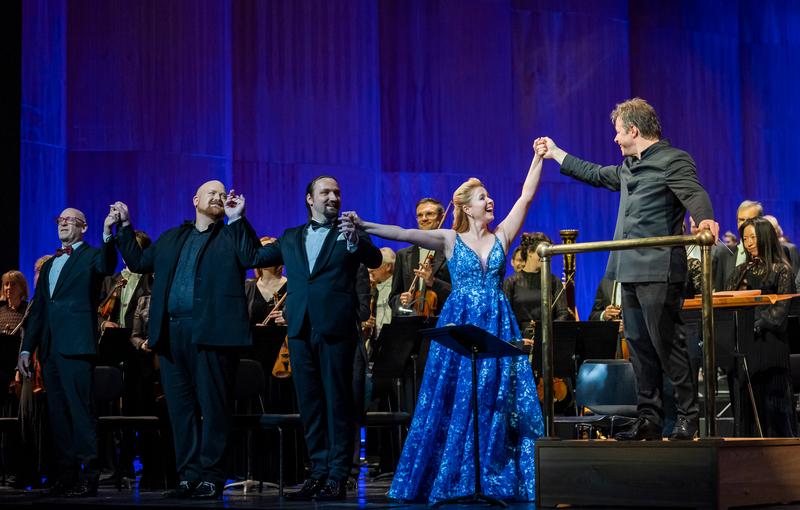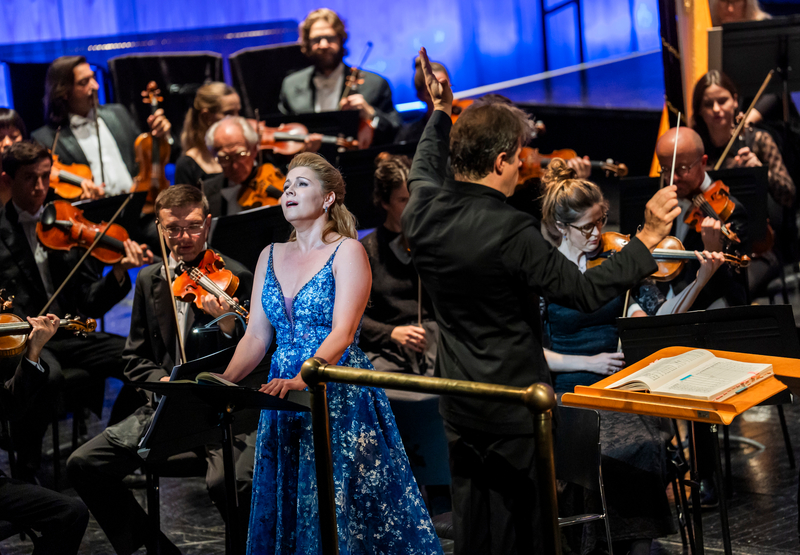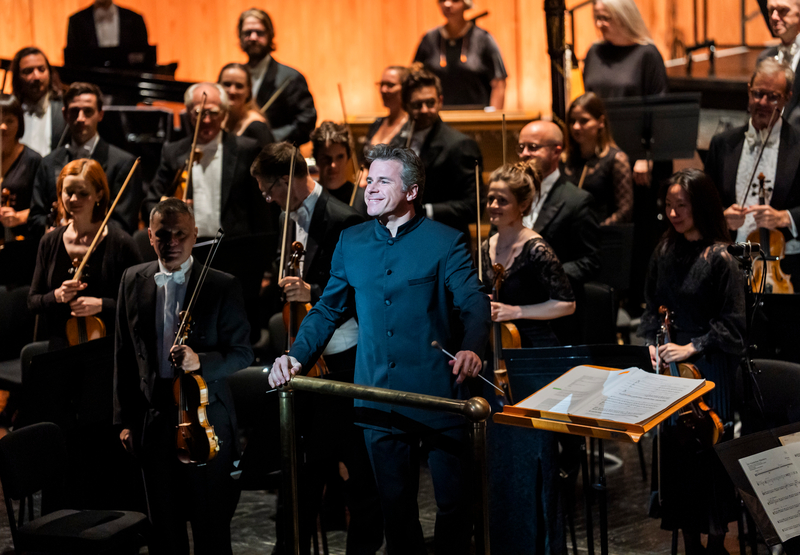Jakub Hrůša and Friends in Concert, Royal Opera review - fleshcreep in two uneven halves | reviews, news & interviews
Jakub Hrůša and Friends in Concert, Royal Opera review - fleshcreep in two uneven halves
Jakub Hrůša and Friends in Concert, Royal Opera review - fleshcreep in two uneven halves
Bartók kept short, and a sprawling Dvořák choral ballad done as well as it could be

Between bouts of that far from shabby, still shocking masterpiece Tosca, Royal Opera music director Jakub Hrůša went for fleshcreep: too little of Bartók's The Miraculous Mandarin – given a chorus, he could have done the half-hour ballet, not just the suite – and too much of a spooky thing in a big Dvořák cantata.
The Spectre's Bride was last heard in London at the Proms conducted by Hrůša’s late master Jiří Bělohlávek. I’d only previously heard Rozhdestvensky feature it in a 1991 Prom, and was racking my brains to remember why it didn’t stick. Here’s the reason. Imagine, with a bit of poetic licence, the scene in Birmingham in 1883, where the festival committee tells Dvořák he’s been such a hit in Britain that they want to commission a 90-minute cantata from him. “Fine,” says Dvořák, “I’d like to set it to a folk balled by my compatriot Erben, though to be honest I could probably do it best at a third of the length”. Which he later did with other Erben tales in four tone-poems which are among his absolute masterpieces. That The Spectre’s Bride isn’t can be ascribed to its endless repetitions, the unnecessary stops and starts between sequences as an unfortunate maiden who’s lost her entire family agrees to ride off in the middle of the night with her returned sweetheart, rather slow to realise he’s a ghost up to no good.
Inspiration is plentiful, all the same: in the careful unfolding of themes through the finely-scored orchestral introduction, in some of the spectre-tenor’s chilling responses to the guileless girl, in the romp of cadavers told by the narrator (a baritone) and chorus, and above all in the exquisite epilogue just when you were expecting an orotund Christian choral message.  Hrůša, absolute master of everything he touches and always clear in intent, made these passages shine and coruscate. But the knockout, as one might have predicted from her stunning performance as Smetana’s heroic princess Libuše with Hrůša and the Czech Philharmonic – I caught the airing in Smetana’s home town of Litomyšl, but it’s the Prague performance which should reach CD – was soprano Kateřina Kněžíková (pictured above). She has an unerring luminosity at the top of the register which makes her the natural successor to another beautiful voice, that of Gabriela Beňačkova; both use the instrument with such intelligence and clarity of emotion, too.
Hrůša, absolute master of everything he touches and always clear in intent, made these passages shine and coruscate. But the knockout, as one might have predicted from her stunning performance as Smetana’s heroic princess Libuše with Hrůša and the Czech Philharmonic – I caught the airing in Smetana’s home town of Litomyšl, but it’s the Prague performance which should reach CD – was soprano Kateřina Kněžíková (pictured above). She has an unerring luminosity at the top of the register which makes her the natural successor to another beautiful voice, that of Gabriela Beňačkova; both use the instrument with such intelligence and clarity of emotion, too.
Nicky Spence, stepping in at relatively short notice for Pavel Černoch as the Satanic villain who, we learn from the chorus, would have ripped his fiancé’s beautiful body up into strips had he succeeded in his dastardly plan, showed his mastery of Czech, his gift for characterisation and some ringing sounds at full pelt. Idiomatic narrative came from Pavol Kubáň, though it’s unfortunate that his role suffers the endless repetition of the same lines. The moonlit ride, too, would work better without its endless interruptions, but you can blame Dvořák’s commission for that; even so the dark orchestral colours as the phantom horror asks his lady to give up the last of her religious trinkets did succeed in holding the tension. The choral part is safe and fun until a final breakout into fugue; it was irreproachably well done here.  Clarinets in pairs gave us typical Dvořákian Bohemianness; the lone one with which the gang-oppressed girl in The Miraculous Mandarin lures her victim makes a very different sound. If the strings didn’t project Bartók’s frenetic opening cityscape from the stage as they might have done in the concert hall – brass made amends – the colours and shifts of this still radical-sounding score all came across under Hrůša's unerring control. It might have helped the audience, kept in the dark, to be able to read descriptors for the various stages in this ballet-pantomime, such as the Philharmonia provided in its Bartók series; but maybe the story’s so horrid and unsound that ignorance could be bliss.
Clarinets in pairs gave us typical Dvořákian Bohemianness; the lone one with which the gang-oppressed girl in The Miraculous Mandarin lures her victim makes a very different sound. If the strings didn’t project Bartók’s frenetic opening cityscape from the stage as they might have done in the concert hall – brass made amends – the colours and shifts of this still radical-sounding score all came across under Hrůša's unerring control. It might have helped the audience, kept in the dark, to be able to read descriptors for the various stages in this ballet-pantomime, such as the Philharmonia provided in its Bartók series; but maybe the story’s so horrid and unsound that ignorance could be bliss.
Explore topics
Share this article
The future of Arts Journalism
You can stop theartsdesk.com closing!
We urgently need financing to survive. Our fundraising drive has thus far raised £49,000 but we need to reach £100,000 or we will be forced to close. Please contribute here: https://gofund.me/c3f6033d
And if you can forward this information to anyone who might assist, we’d be grateful.

Subscribe to theartsdesk.com
Thank you for continuing to read our work on theartsdesk.com. For unlimited access to every article in its entirety, including our archive of more than 15,000 pieces, we're asking for £5 per month or £40 per year. We feel it's a very good deal, and hope you do too.
To take a subscription now simply click here.
And if you're looking for that extra gift for a friend or family member, why not treat them to a theartsdesk.com gift subscription?
more Classical music
 Jakub Hrůša and Friends in Concert, Royal Opera review - fleshcreep in two uneven halves
Bartók kept short, and a sprawling Dvořák choral ballad done as well as it could be
Jakub Hrůša and Friends in Concert, Royal Opera review - fleshcreep in two uneven halves
Bartók kept short, and a sprawling Dvořák choral ballad done as well as it could be
 Monteverdi Choir, ORR, Heras-Casado, St Martin-in-the-Fields review - flames of joy and sorrow
First-rate soloists, choir and orchestra unite in a blazing Mozart Requiem
Monteverdi Choir, ORR, Heras-Casado, St Martin-in-the-Fields review - flames of joy and sorrow
First-rate soloists, choir and orchestra unite in a blazing Mozart Requiem
 Cho, LSO, Pappano, Barbican review - finely-focused stormy weather
Chameleonic Seong-Jin Cho is a match for the fine-tuning of the LSO’s Chief Conductor
Cho, LSO, Pappano, Barbican review - finely-focused stormy weather
Chameleonic Seong-Jin Cho is a match for the fine-tuning of the LSO’s Chief Conductor
 Classical CDs: Shrouds, silhouettes and superstition
Cello concertos, choral collections and a stunning tribute to a contemporary giant
Classical CDs: Shrouds, silhouettes and superstition
Cello concertos, choral collections and a stunning tribute to a contemporary giant
 Appl, Levickis, Wigmore Hall review - fun to the fore in cabaret and show songs
A relaxed evening of light-hearted fare, with the accordion offering unusual colours
Appl, Levickis, Wigmore Hall review - fun to the fore in cabaret and show songs
A relaxed evening of light-hearted fare, with the accordion offering unusual colours
 Lammermuir Festival 2025, Part 2 review - from the soaringly sublime to the zoologically ridiculous
Bigger than ever, and the quality remains astonishingly high
Lammermuir Festival 2025, Part 2 review - from the soaringly sublime to the zoologically ridiculous
Bigger than ever, and the quality remains astonishingly high
 BBC Proms: Ehnes, Sinfonia of London, Wilson review - aspects of love
Sensuous Ravel, and bittersweet Bernstein, on an amorous evening
BBC Proms: Ehnes, Sinfonia of London, Wilson review - aspects of love
Sensuous Ravel, and bittersweet Bernstein, on an amorous evening
 Presteigne Festival 2025 review - new music is centre stage in the Welsh Marches
Music by 30 living composers, with Eleanor Alberga topping the bill
Presteigne Festival 2025 review - new music is centre stage in the Welsh Marches
Music by 30 living composers, with Eleanor Alberga topping the bill
 Lammermuir Festival 2025 review - music with soul from the heart of East Lothian
Baroque splendour, and chamber-ensemble drama, amid history-haunted lands
Lammermuir Festival 2025 review - music with soul from the heart of East Lothian
Baroque splendour, and chamber-ensemble drama, amid history-haunted lands
 BBC Proms: Steinbacher, RPO, Petrenko / Sternath, BBCSO, Oramo review - double-bill mixed bag
Young pianist shines in Grieg but Bliss’s portentous cantata disappoints
BBC Proms: Steinbacher, RPO, Petrenko / Sternath, BBCSO, Oramo review - double-bill mixed bag
Young pianist shines in Grieg but Bliss’s portentous cantata disappoints
 theartsdesk at the Lahti Sibelius Festival - early epics by the Finnish master in context
Finnish heroes meet their Austro-German counterparts in breathtaking interpretations
theartsdesk at the Lahti Sibelius Festival - early epics by the Finnish master in context
Finnish heroes meet their Austro-German counterparts in breathtaking interpretations
 Classical CDs: Sleigh rides, pancakes and cigars
Two big boxes, plus new music for brass and a pair of clarinet concertos
Classical CDs: Sleigh rides, pancakes and cigars
Two big boxes, plus new music for brass and a pair of clarinet concertos

Add comment